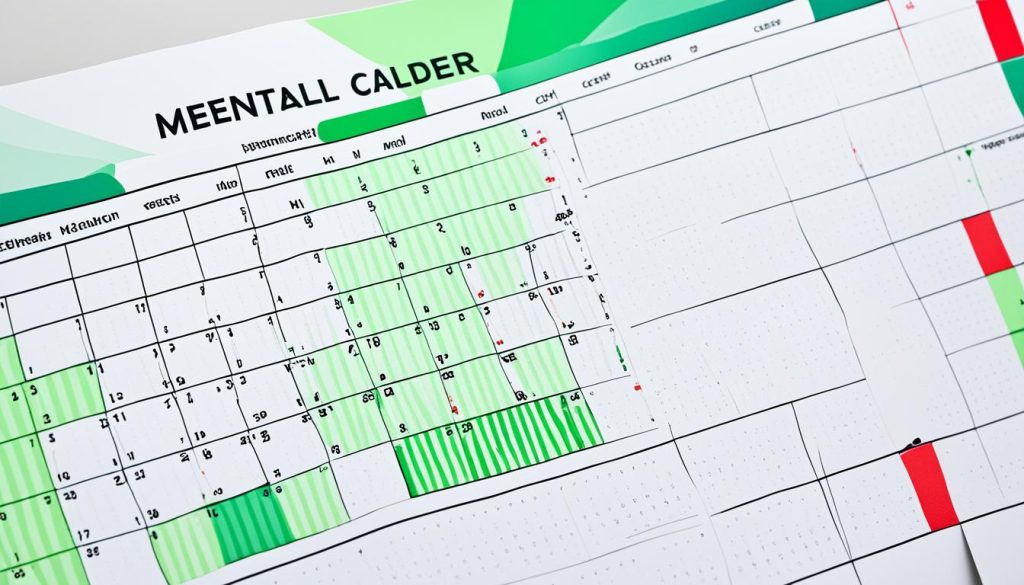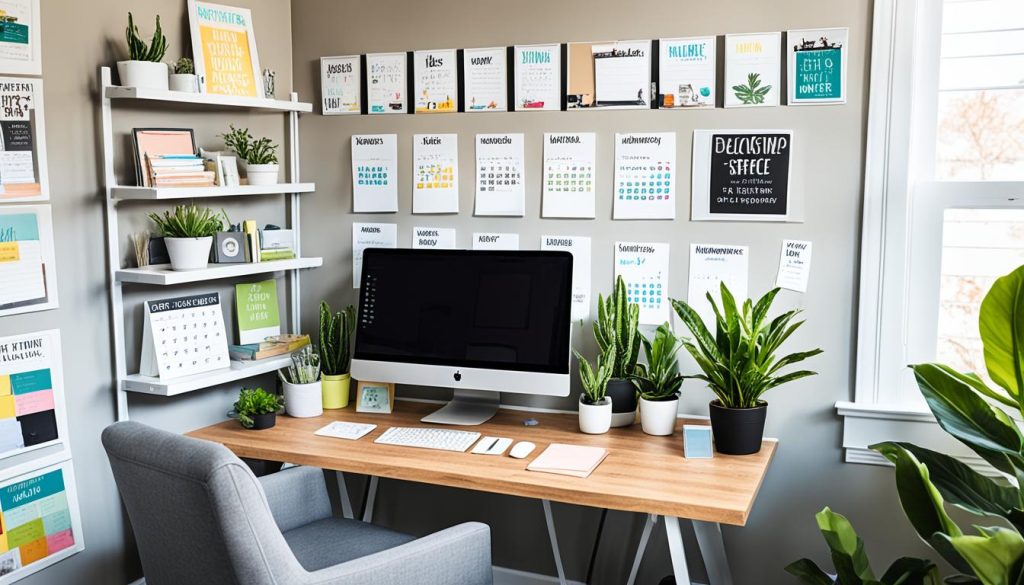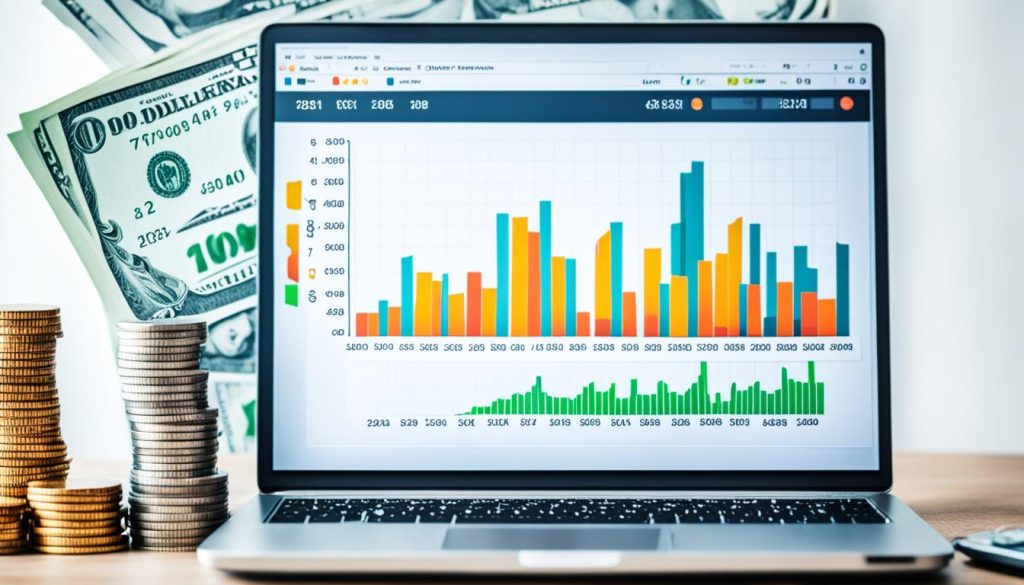Do you dream of turning your passion into a successful home business? With blogging, this dream can become a reality. It’s a way to work from home and still enjoy a good income and balanced life.
Blogging is a great choice for starting a home business. It offers freedom and the chance to control your money future. In this guide, we’ll explore the steps to take- from finding the right topic to making money from your blog.
Are you excited to start your journey to financial freedom? Let’s discover how to make your blogging dreams come true.
What is Blogging and Why Start a Blog?
Blogging is a great way to work from home. It can lead to passive income, flexibility, and location independence. It’s perfect as a side job or a main one. With a blog, you can share what you love. This might include traveling or cooking, for example. You can make money from your blog and even travel while doing it.
Introduction to Blogging as a Legitimate Work-from-Home Business
In the past, blogging was usually just a hobby. Now, it’s a big business from home across America. There are over 31.7 million blogs in the U.S. alone. This shows there’s a lot of potential in making money and working in a way that suits you. By talking about what you know and love, you can create a business that allows you to work freely and travel without limits.
Benefits of Blogging: Passive Income, Flexibility, and Location Independence
Blogging doesn’t have to be just for fun. It can be a serious way to make money from home. You can earn through ads, by being an affiliate for products, or by selling your own digital items. The best part is, you get to choose when and where to work. This offers a great work-life balance and the chance to see the world.
| Benefit | Description |
|---|---|
| Passive Income | Earn money through advertising, affiliate marketing, and selling digital products even when you’re not actively working. |
| Flexibility | Set your own schedule, work from home, and have the freedom to balance your personal and professional life. |
| Location Independence | Work from anywhere with an internet connection, allowing you to travel and explore the world while maintaining your business. |
Choosing a Niche and Domain Name
Starting a home blogging business begins with selecting the right niche and domain name. This first step is crucial. It shapes your blog’s identity, content plan, and how you’re seen online. We’ll look at how to pick a profitable niche and find the perfect domain name.
Identifying Your Passion and Expertise
Choosing a blog niche means finding what you love and know a lot about. Successful bloggers enjoy and understand their topics. Think about your hobbies and what you know well. What gets you excited to talk about? This is where you’re likely to shine and help your readers.
Just start writing even if you’re not an expert. Be real about what you know and keep learning. Your own thoughts and experiences make you stand out. They help you build trust with your readers.
Researching Profitable Niches
Next, see if your passion has the potential to make money. Look online to find tools, forums, and communities in your niche. Are people talking about it a lot? Do they need answers you can provide?
As Blog Savvy Panda suggests, niches like personal finance and health are often profitable. But it’s crucial to pick something you love. When your passions and niche match, your blog will succeed in the long run.
Securing a Memorable Domain Name
Once you’ve decided on your niche, it’s vital to find a great domain name. According to WPBeginner, stick to a “.com” domain if you can. Keep your name short – under 15 characters – for easy memory.
Try to include niche keywords in your domain for better SEO. Stay away from hyphens and extra letters. They make your domain easy to mistype. Use generators to find ideas, and don’t wait too long to pick one. Good domains are claimed fast.
Your domain name is your blog’s online home. Choose it with care, making sure it fits your niche and goals. This aligns your passion with your blog from the start.

Setting Up Your Blog
After picking your blog’s topic and name, it’s time to start. WordPress makes setting up easy. This blogging platform doesn’t need coding skills to use. It’s perfect for making your blog special.
Choosing the Right Blogging Platform
WordPress is well-known for being easy to use. It lets you change your blog’s look with lots of options. This is great for anyone, whether you’re new to blogging or have done it before. It helps make your blog look professional without needing to be a tech expert.
Securing a Domain Name and Web Hosting
Your blog needs a name and a place to live online. Getting a good domain name and web hosting are both important. Your domain name should be easy to remember and tell people what your blog is about. You might also want to buy other endings, like .net or .org, to protect your blog’s name.
Web hosting lets your blog appear on the internet. Pick a hosting service that won’t let you down. They should offer lots of space, fast speeds, and keep your blog safe.
Choosing WordPress and getting the right domain and hosting are key steps for your blog. Make sure to pick what’s best for you and your budget. These choices will really affect how good your blog looks and how many people see it.
Content Creation and Editorial Calendar
Being a blogger at home means making impressive content regularly. This is what helps your online business grow. So, having an editorial calendar is crucial. It helps make your blog posts better for search engines.
Writing Engaging and SEO-Friendly Blog Posts
An editorial calendar is great for planning awesome blog posts that people and search engines. Here are some steps you can follow:
- Figure out who you’re writing for and make content that matters to them.
- Use tools like Semrush Keyword Magic Tool to find the best keywords for your posts.
- Publish regularly, like once every week, to keep your readers engaged.
- Work with experts in your topic to make sure your content is top-notch.
- Try different kinds of posts, like lists, how-tos, and interviews, to keep things interesting.
Using an editorial calendar makes your life easier. You’ll make content that’s great for search engines. This will bring more people to your blog and boost your business.

Home Blogging Business Setup
Starting a home blogging business is exciting. It offers flexibility, income, and the chance to follow your dreams. There are important steps to take for a successful start.
It’s key to make a workspace at home. Choose a place that helps you focus. This will be where you write, research, and connect with others about your blog. Having a separate area helps you think like a pro and keep your work and life in balance.
Setting a daily routine helps you keep up with your blog. Many top bloggers suggest you set hours for writing, marketing, and talking to your readers. This plan keeps you focused and avoids getting too tired.
- Set up a daily schedule for creating content, marketing, and talking with your audience.
- Use time tricks like the Pomodoro Technique to get more done.
- Buy tools that make blogging tasks easier, such as productivity apps and content management systems.
Good time management is a must for your blog business. The Pomodoro Technique can really help. Also, check out apps and software that make blogging smoother. This frees up time for what really matters – creating content and talking with your community.

With a clear workspace, a solid routine, and good time management, your blog business will thrive. This way, you can keep your work and private life in harmony. Enjoy your journey as an entrepreneur!
Monetization Strategies
Being a home-based blogger gives you ways to turn your hobby into income. You can use affiliate marketing and sponsored content. These methods create passive income. You can also sell digital products and services to add to your earnings.
Affiliate Marketing and Sponsored Content
In affiliate marketing, you partner with brands. You earn a commission for sales through your blog. This lets you make a recurring income without keeping stock. Sponsored content means working with brands to make posts or reviews for a fee.
These methods help you make money without a lot of effort. They use your expertise and provide value to your blog readers. Choosing the right partners and creating interesting content can make your blog a good business.
Selling Digital Products and Services
You can also make money with e-books, courses, or webinars. These show your expertise and can make you more money. Selling your own things helps you connect with your readers and be seen as an expert.
This way, you don’t only rely on partnerships or sponsored posts for income. It lets you offer something of your own to your readers. This can bring in more money than just selling someone else’s products.

| Monetization Strategy | Advantages | Considerations |
|---|---|---|
| Affiliate Marketing |
|
|
| Sponsored Content |
|
|
| Digital Products and Services |
|
|
Search Engine Optimization (SEO)
As a home blogging business owner, SEO’s power is key. SEO helps your site and content rank better on search engines. It brings people to your blog without paid ads. By using on-page and off-page SEO, you can stand out and find more customers.
On-Page SEO Techniques
On-page SEO is about improving your blog directly for better search results. It includes a few key steps:
- Keyword Research and Optimization: Find the right keywords your audience uses. Add them to your content, titles, and URL for better search visibility.
- Content Creation: Write posts that are useful, easy to read, and full of information. Organize your content with titles, lists, and subheadings to make it clear.
- Image Optimization: Make your pictures easier to find by naming them clearly and adding tags and captions that describe them well.
- Technical SEO: Improve things like your site’s speed and mobile-friendliness. Good technical setup helps search engines like your blog more.
Off-Page SEO Strategies
Off-page SEO is what you do outside your blog to boost your search rank. It involves:
- Link Building: Get links from trusted sites and blogs in your field. It shows search engines your site is credible and valuable.
- Social Media Engagement: Be active on social media. Share your blog posts and connect with people to grow your online influence.
- Guest Posting: Write for other blogs in your industry. This helps you reach a wider audience and gain more backlinks.
- Citation and Directory Listings: Make sure your contact info is correct on various online directories. Consistent details increase trust with search engines.
Using both on-page and off-page SEO boosts your home blog’s visibility. It draws more visitors and grows your customer base.

Social Media Marketing and Promotion
Being a home-based blogger, using social media well is key to growing. A good social media plan helps you connect with your readers. It can also drive more people to your blog.
Social media makes your blog more visible and easier to find. When you make your blog posts fit social media, they can reach more people. This can bring more visitors to your site naturally. Also, a strong social media presence shows you know your stuff. This makes you more trustworthy as a blogger.
Effective Social Media Strategies for Bloggers
- Choose the right social media platforms: Find out where your readers are most active, like Facebook, Instagram, Twitter, or LinkedIn. Concentrate on those.
- Create a content calendar: Planning your social media posts ahead makes sure you’re always out there. This keeps you on top of things and boosts your content’s effect.
- Optimize your blog posts for social media: Make your social media images catchy, write great captions, and use the right hashtags. This will get more eyes on your blog.
- Engage with your audience: Talk back to comments, start chats, and share things your followers make. This builds stronger bonds with them.
- Leverage social media analytics: Use the tools on social platforms to see how your posts are doing. Learning from what works best helps you get smarter with your social media.
You can also try paid social media advertising to grow your blog’s audience. Targeted ads on places like Facebook, Instagram, or LinkedIn can get more eyes on your content. They can even turn some readers into leads or customers.
Don’t forget, social media marketing is a steady effort that takes time to show results. Being regular, creative, and always adding value for your audience are key. They lead to success in blogging and using social media.
| Social Media Platform | Key Statistics |
|---|---|
| Over 2.9 billion monthly active users, 200 million businesses | |
| Majority of users are between 18-34 years old, average user spends 11 hours per month on the app | |
| Over 200 million daily active users, 9th most visited website globally |
Building an Email List
If you’re a home-based blogger, a strong email list is vital for your business success. Email marketing helps you keep in touch with your readers. It also lets you share new content and products with them.
Importance of Email Marketing for Bloggers
Email marketing is vital for bloggers. It offers many benefits that can help your business grow:
- Direct communication with your readers lets you share updates and offers easily.
- Sending valuable content to your list often makes your readers more loyal.
- Email subscribers often respond better to your promotions, raising your sales.
- Your email list is something you own, not like social media accounts that can vanish.
Studies show email marketing’s big impact. One blogger grew from zero to over 6,500 subscribers in a year. They had high open and click rates. This helped them earn a lot more money through their list.
For a successful email list, focus on offering value and engaging with your readers. Always test and tweak your methods. Tools like MailerLite and ConvertKit make managing your list easier.
By putting time and work into building your email list, your blog can become a reliable source of income and connect with more people.
Tracking and Analyzing Your Blog’s Performance
Running a blog from home is more than just about creative content. It’s crucial to keep an eye on your blog’s performance. By looking at how many people visit, engage with your posts, and so on, you can find ways to do better.
Leveraging Blog Analytics
Use special tools to learn about who’s reading your blog and how they interact with it. You can find out so much, like:
- Website traffic – Keep an eye on how many visitors come, how many pages they view, and how many are new.
- Engagement metrics – See how long people stay on your site, which posts they like most, and more.
- Conversion rates – Figure out how well you make money, like through ads or selling products.
- Revenue and earnings – Watch the money your blog brings in, including ads, affiliate deals, or your own products.
Looking at this info often helps you understand what your readers like and want. This means you can make your blog even better.
Identifying Trends and Opportunities
The data from your blog can show you paths to grow. Watch for patterns in how people visit, engage, and what they buy. This way, you can see what’s working and do more of it. Here’s how the info can help:
- Find out which topics and post types your audience loves.
- Make your blog and posts even better to get more readers.
- Change how you make money to earn more.
- Spot chances to grow, such as launching new products or teaming up with others.
Keep checking your blog’s progress, and react based on the feedback you get. Doing this can lead to long-lasting success for your blog.
| Metric | Description | Why It Matters |
|---|---|---|
| Website Traffic | The number of visitors, page views, and unique visitors to your blog. | Shows how many people see and interact with your posts. |
| Engagement | Info like time on site, bounce rate, and which content is popular. | Helps you see how interested your readers are and what they like. |
| Conversion Rate | How good your money-making efforts, like ads or selling stuff, are. | Let’s you make these efforts better to earn more. |
| Revenue | Money made from the blog, from ads, affiliates, or products. | Shows how well your blog is doing as a business. |
Scaling and Outsourcing
As your home blogging business grows, you’ll want to think about scaling up and outsourcing. This can help make things run smoother and give you more time. You might hire virtual assistants or writers to handle different parts of your business. This frees you to work on big strategies and create content.
Outsourcing blog content is a smart move. Studies show most businesses turn to outsourcing for their content needs. This applies to both B2B and B2C companies. Doing this can up your content game and the quality of your posts without the full price of hiring someone.
When thinking about blog scaling and outsourcing, there are key points to keep in mind. Industry info reveals:
- It takes about three hours, on average, to write a blog post. Outsourcing can cut costs over full-time writers.
- There’s a wide price range for outsourced content, from $5 to $5,000 per post. Quality freelance writers usually range from $25 to $200 per post, which is a good deal for most.
- Getting exclusive rights to outsourced content is important. It prevents issues with duplicate content, which is bad for SEO.
To grow your blogging business in the right way, set a budget and think about the content’s quality and goal. Give clear directions to your outsourced writers to make sure the content is what you want. This ensures you get to share your expertise and chosen style in the content. In the end, it brings better results for your blog.
Outsourcing can cover more than just writing, like getting virtual assistants for outreach and building links. This way, you can spend more time on the big picture and growing your blogging business.
By using outsourcing and scaling up, you can improve your home blogging business. It can help with growth and efficiency, and give you a better work-life balance. Focus on what you do best, and leave the rest to experts.
Legal and Financial Considerations
Starting a home blogging business means you must be careful with laws and finances. You need to follow the rules and keep your money records straight. This helps your online business grow and last for a long time.
Legal Considerations for Home Blogging Businesses
For any home blogging business, knowing the local legal needs is a must. This includes several steps:
- Get the right business licenses and permits.
- Register your business, like as a sole proprietorship, a partnership, or an LLC.
- Follow tax laws, like paying self-employment taxes and sales taxes.
- Protect what’s yours, such as your blog’s name, logo, and its content.
- Respect privacy laws, especially when dealing with reader’s personal info.
Financial Considerations for Home Blogging Businesses
Managing your finances well is key to making your home blogging business a hit. Here’s what to focus on:
- Create a good business plan that talks about your money goals and how you plan to spend and make money.
- Use a different bank account and accounting method for your business money.
- Understand tax rules, like what you can write off as business expenses.
- Look into getting money, like through loans or by using crowdfunding, to help your business grow.
- Always check on your financial reports to see how you’re doing and to help make good choices.
By dealing well with legal matters and financial issues, your home blogging business can really take off. These steps will make sure you’re set up for success.
| Legal Considerations | Financial Considerations |
|---|---|
|
|
Addressing legal and financial matters is vital for the success of your home blogging business. It lays the foundation for growth and longevity.
Maintaining a Work-Life Balance
For a home-based blogger, balancing work and life is key to long-term success. The flexibility of a home-based business might make you work too much. This can lead to burnout and ignore time for yourself.
To stay in balance, setting clear boundaries is crucial. Use regular breaks and time with your loved ones. Also, keeping a steady work schedule is important, as experts advise. This can make you more creative and productive.
A good work-life balance helps you personally and your blogging business. Spending time on well-being makes you ready for challenges and chances. So, balance is the key to a successful home-based blog.

